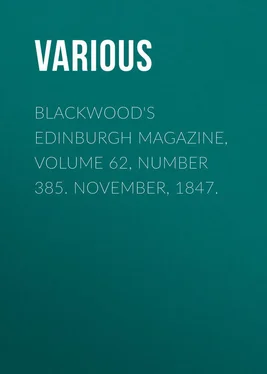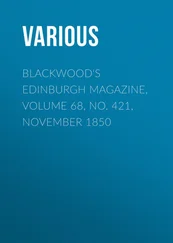Various - Blackwood's Edinburgh Magazine, Volume 62, Number 385. November, 1847.
Здесь есть возможность читать онлайн «Various - Blackwood's Edinburgh Magazine, Volume 62, Number 385. November, 1847.» — ознакомительный отрывок электронной книги совершенно бесплатно, а после прочтения отрывка купить полную версию. В некоторых случаях можно слушать аудио, скачать через торрент в формате fb2 и присутствует краткое содержание. Издательство: Иностранный паблик, Жанр: periodic, foreign_edu, Путешествия и география, на английском языке. Описание произведения, (предисловие) а так же отзывы посетителей доступны на портале библиотеки ЛибКат.
- Название:Blackwood's Edinburgh Magazine, Volume 62, Number 385. November, 1847.
- Автор:
- Издательство:Иностранный паблик
- Жанр:
- Год:неизвестен
- ISBN:нет данных
- Рейтинг книги:4 / 5. Голосов: 1
-
Избранное:Добавить в избранное
- Отзывы:
-
Ваша оценка:
- 80
- 1
- 2
- 3
- 4
- 5
Blackwood's Edinburgh Magazine, Volume 62, Number 385. November, 1847.: краткое содержание, описание и аннотация
Предлагаем к чтению аннотацию, описание, краткое содержание или предисловие (зависит от того, что написал сам автор книги «Blackwood's Edinburgh Magazine, Volume 62, Number 385. November, 1847.»). Если вы не нашли необходимую информацию о книге — напишите в комментариях, мы постараемся отыскать её.
Blackwood's Edinburgh Magazine, Volume 62, Number 385. November, 1847. — читать онлайн ознакомительный отрывок
Ниже представлен текст книги, разбитый по страницам. Система сохранения места последней прочитанной страницы, позволяет с удобством читать онлайн бесплатно книгу «Blackwood's Edinburgh Magazine, Volume 62, Number 385. November, 1847.», без необходимости каждый раз заново искать на чём Вы остановились. Поставьте закладку, и сможете в любой момент перейти на страницу, на которой закончили чтение.
Интервал:
Закладка:
There were some English settlers in this neighbourhood; and some of the party drove out to visit the sugar establishment of Mr Etty – brother of the well-known artist – about three miles from the town. He was in England, but his sons came down in the evening to the hotel to offer their civilities. They had been out pig-shooting, and had enjoyed their sport, such as it is, for they had killed thirteen pigs. The party were invited to similar shooting for the next day.
On the next day they went; but an old carriage and a clumsy charioteer delayed them, and they arrived some three hours after their appointment. But etiquette does not seem to have been the order of the day, for the inviters had gone out to enjoy their pig-shooting by themselves. The invited were left to amuse themselves as they might until seven or eight o'clock, when the inviters returned, and the whole party sat down to dinner. At dinner, their talk was of tigers.
Whether Mr Jukes gives this incident in wrath, or simple recollection, we know not; but we surmise, that he and his friends would have been just as well pleased if the owners of the sugar establishment had not brought them out so far for nothing.
Next day they proceeded on their excursion, and found native civility on the alert every where. Some orders to this effect appeared to have been sent to the Dutch authorities. At the first post-house where they stopped, a man stepped forward with a tray of cups of tea, glasses of cocoa and water, and rice-cakes; and a large party were awaiting them with ponies. Each of them also found a man on horseback ready to attend him, and carry his gun and game-bag. A petty chief rode before them, and another with a small party brought up the rear, so that they formed quite a cavalcade. But the natives with their gaily-coloured dresses, blue and red coloured saddles, silver trappings to their horses, and ornamented creeses in their girdles, "quite cut out the Englishmen in appearance, with their dingy shooting-jackets and soiled trousers."
And here we may fairly ask the question, why those gentlemen should have appeared in "dingy shooting-jackets and soiled trousers?" This is not a question of dandyism. They were to appear before the authorities of another country, before the gentlemen of another nation. They were also to be presented to native gentlemen and rajahs, who have as quick an eye for the outward man as any people in the world. And while those showy costumes – even in so trifling a matter as the attendance on a shooting-party – exhibited the taste of the people in those matters, why should the Englishman exhibit his own, in dingy shooting-jackets and soiled trousers? In fact, in matters of this kind, a man in foreign countries, and especially in the military and naval service of his country, should recollect the effect of this beggarliness on the mind of strangers. The party must have been the objects of ridicule and contempt to the very peasants around them.
As they rose towards the hills, the country appeared to be in general richer and more picturesque. From the summit of the first ridge the country before them was gently undulating, interspersed with patches of wood, that looked like a wide-spread park, till at some miles distance it rose up the slopes of a volcanic mountain – the Lamongan. On the sides of this huge volcano, the woods became thicker and more continuous, till they reached the bare piles of ashes and cinders forming the upper cone.
The road then lay through coffee plantations. These were very pleasant-looking places. The coffee shrubs were planted in rows, with tall trees between each row to shelter the coffee from the sun. The alleys between the trees were carpeted by rich green turf, forming pleasant glades. The plantations were generally neatly fenced and often extensive; as much as twenty or thirty acres in one plot. Every now and then they passed on the roadside a noble tree, with wide-spread, drooping branches, a species of banyan tree, under which was often seen a bullock-waggon with its team.
All this was oriental and picturesque; but the scenery sometimes reminded them of spots in Devonshire, so green and fresh was all the vegetation, and so pleasant were the deep narrow lanes and sparkling brooks. Their halting-place for the day was a large and lofty bamboo-house on a raised terrace of brick, having a broad veranda all round, a large central saloon, and two or three good and well-furnished bed-rooms on each side. This veranda had the advantage also of a noble landscape. At the back, it looked down a steep bank to a beautiful circular lake about a quarter of a mile across, bordered by a thick belt of wood, and right over it at a few miles' distance, the stately cone of the Lamongan, upwards of four thousand feet high, with a wreath of white smoke curling from its summit.
To this feast of natural beauty was added the more substantial one of the table. In the veranda they found a table spread with a snow-white cloth, and all the conveniencies of plate, glass, and cutlery. A troop of willing servitors was in attendance, who covered the table with a smoking-hot breakfast, piles of rice curries, pillaus, and fruits, with tea and coffee. All this seemed to be done by enchantment; there was no host, no master of the house to trouble them with ceremony; the house and all that belonged to it seemed to be theirs as long as they chose to stay. Whose was the furniture, or who provided the entertainment, they knew not. In those comfortable quarters, they determined to halt for the next day, and try to get a little shooting.
The naturalist, however, on this evening, employed himself more rationally than his companions. While they went out shooting, he took his hammer and went to the ravine, to learn something about the masses of lava and basalt which lay every where. The whole ground gave evidences of the existence of an ancient volcano. The circular lake seemed to have been a crater; its depth was said to be three hundred and ninety feet. But the noble proportions of the landscape still attracted the eye, and within the horizon shot up the pile of the Semmi, – the loftiest, most perfect, and most majestic-looking cone that they ever saw in Java, its height being twelve thousand two hundred and ninety-two feet – a greater elevation than that of the Peak of Teneriffe. Every thing was lovely in form and colour, and glittered in the hot sunshine, while a fine fresh breeze from the south tempered the heat, and gave it the feeling of a summer day at home.
Still, though all this seemed a land of magic, to those who probably had never thought of Java but as a place of pestilence, of burning soil, and scorching sunshine, it was not all fairy land. After dinner, at dusk, as Mr Jukes was strolling round the house smoking a cigar, a man with a long spear came up to him, and began to turn him back with an earnest speech, of which the only word he understood was machan ; but it was an important one, and the point of the whole oration, for it is the Javanese for tiger.
Having recourse to one of the party as interpreter, he found that the spearman was begging of him not to walk in the dark, as tigers were abundant there; which, he emphatically assured them, eat men, and that they had even sometimes come into the house. In the veranda they found a guard of four spearmen, keeping watch for the same purpose. The Englishman thought that they were jesting, until he saw that none of the people themselves went a few yards beyond the house without a torch. One man going to bathe in the lake just below, another accompanied him with a torch. They also saw four men coming up the road with two large torches, who, they said, were returning from their work from the village hard by. They still thought their fears a little exaggerated; but on that very night a man was killed by a tiger at a village about two miles off, as he was going to his work before daylight with two others. His body was recovered the next day.
Читать дальшеИнтервал:
Закладка:
Похожие книги на «Blackwood's Edinburgh Magazine, Volume 62, Number 385. November, 1847.»
Представляем Вашему вниманию похожие книги на «Blackwood's Edinburgh Magazine, Volume 62, Number 385. November, 1847.» списком для выбора. Мы отобрали схожую по названию и смыслу литературу в надежде предоставить читателям больше вариантов отыскать новые, интересные, ещё непрочитанные произведения.
Обсуждение, отзывы о книге «Blackwood's Edinburgh Magazine, Volume 62, Number 385. November, 1847.» и просто собственные мнения читателей. Оставьте ваши комментарии, напишите, что Вы думаете о произведении, его смысле или главных героях. Укажите что конкретно понравилось, а что нет, и почему Вы так считаете.












